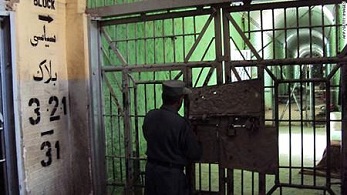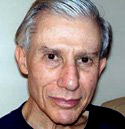US Afghan Detainees Sent to Torture Prisons

An Afghan policeman stands guard inside Kandahar jail on April
27, 2011. (Photo: CNN / Caption: RAWA.org)
Post-9/11, torture became official US policy. Bush officials mandated it. Obama continues it in US overseas prisons and foreign ones, including in Afghanistan.
Even the Army Times noticed. On March 18, it headlined "US sent detainees to banned prisons," saying:
A report by two human rights groups revealed the practice continues "despite an announced moratorium on such moves." More on their report below.
The New York Times also covered the story in an article headlined, "Groups Report on the Continued Transfer of Detainees to Afghan Prisons," saying:
Following months of investigations, evidence shows American agencies "abett(ed) torture," besides committing it at US run prisons like Bagram, Guantanamo, and numerous black sites. It's one of many American dirty secrets.
While "not groundbreaking," the new report increases the body of evidence "uncovered last year by the United Nations, and highlights the continuing challenge of trying to end the abuse."
Documented cases examined captured US detainees transferred to Afghan facilities known to commit torture. transfers continued after doing so was supposed to stop.
Evidence also suggests US personnel, perhaps including CIA and/or other intelligence officials are involved. US embassy spokesman Gavin Sundwall withheld comment, saying he hadn't seen the report.
He doesn't need it to know what's happening. It's been longstanding since America showed up. Other reports documented egregious abuses at Bagram and other US torture prisons.
On March 17, the Afghanistan Independent Human Rights Commission (AIHRC) and Open Society Foundations (OSF) released their detailed 67-page report.
It covered:
• detainee torture and mistreatment;
• international detainee transfers, monitoring, and joint operations;
• torture and mistreatment by Afghanistan's National Directorate of Security (NDS);
• due process violations;
• accountability and transparency; and
• recommendations for reforming the system.
In recent months, Afghanistan's NDS was criticized for torturing and abusing detainees. AIHRC and OSF raised new concerns. They include "previously undocumented facilities where torture is taking place and the abuse of detainees transferred by international forces."
Finding are based on long-term monitoring and over 100 detainee interviews. Afghanistan's Constitution mandates it.
"Researchers found credible evidence of torture at nine NDS facilities and several Afghan National Police (ANP) facilities."
They include beatings, suspension from ceilings, electric shocks, threatened or actual sexual abuse, and other physical or psychological ill-treatment used to forcibly extract confessions.
Due process is also denied, including the right to counsel, family notification, and other practices denying detainees fundamental rights.
"In response to a 2011 UN report, International Security Assistance Forces (ISAF) suspended all detainee transfers to facilities of concern."
Problems were addressed, and a monitoring system proposed. However, AIHRC and OSF raised troubling questions, including off-site abuse and detainees' fear that reprisals will follow disclosures. It shows more needs to be done to stop lawless practices and protect them.
US forces outside ISAF's chain of command lack monitoring entirely. America hasn't established a system for detainees transferred to Afghan custody.
As a result, "(r)esearchers found credible evidence that some US-transferred detainees have been subjected to torture by Afghan officials."
Ten cases were documented from May 2010 through January 2012. They suggest many other similar ones and a pattern of continuing systematic abuse.
Four detainees said they were held for some time at a facility near Bagram. At least three were transferred to NDS Kandahar after ISAF and US forces suspended transfers there.
"These cases raise serious concerns regarding US policies on detainee transfers, particularly (those) by non-ISAF US forces and US special operations forces."
They include whether appropriate safeguards protected detainees and if America's complicit in torture. The Afghan government established a human rights unit, responded positively to demands for greater access to detention facilities, but thus far "largely failed to hold individuals responsible for detainee abuse accountable."
In some cases, the government reassigned culpable officials elsewhere to commit similar abuses. In addition, AIHRC monitors face challenges accessing NDS facilities, including its Kabul-based Counterterrorism Department 124 (formerly Department 90).
Whatever challenges Afghanistan's government faces, international law is inviolable. Torture is prohibited at all times, under all conditions, with no allowed exceptions. Authorities are responsible for enforcing it and holding violators accountable. Evidence shows they're not doing it. US officials are culpable. As a result, detainee torture continues.
Key AIHRC and OSF recommendations include:
• investigate credibly and hold those culpable accountable;
• assure AIHRC has unrestricted access to all NDS facilities and detainees in them;
• provide the NDS Human Rights Unit full authority to investigate abuses and ability to hold those responsible accountable;
• stop holding detainees incommunicado, and notify family members promptly when arrests are made;
• ensure defense lawyers have access to detainees at all NDS facilities;
• assure detainees aren't sent to facilities known to commit torture; and
• require US authorities to ensure detainees aren't tortured, transfer policies are observed, and international law obeyed.
Washington long ago spurned US and international law. As a result, once the dust settles, expect torture and other detainee abuse to continue. It's gone on for over a decade in Afghanistan alone.
Mandates and recommendations won't stop it. Washington makes its own everywhere it controls at home and abroad, especially in war theaters.
___________________________________________________________________________________

Stephen Lendman: I was born in 1934 in Boston, MA. Raised in a modest middle class family, attended public schools, received a BA from Harvard University in 1956 and an MBA from the Wharton School at the University of PA in 1960 following 2 years of obligatory military service in the US Army. Spent the next 6 years as a marketing research analyst for several large US corporations before becoming part of a new small family business in 1967, remaining there until retiring at the end of 1999. Have since devoted my time and efforts to the progressive causes and organizations I support, all involved in working for a more humane and just world for all people everywhere, but especially for the most needy, disadvantaged and oppressed. My efforts since summer 2005 have included writing on a broad range of vital topics ranging from war and peace; social, economic and political equity for all; and justice for all the oppressed peoples of the world like the long-suffering people of Haiti and the Palestinians. Also co-hosting The Global Research News Hour, occasional public talks, and frequent appearances on radio and at times television. I also am a Research Associate of the Centre for Research on Globalization. I live in Chicago and can be reached at lendmanstephen@sbcglobal.net. Also visit my blog site sjlendman.blogspot.com and listen to The Lendman News Hour on RepublicBroadcasting.org Monday - Friday at 10AM US Central time for cutting-edge discussions with distinguished guests on world and national issues. All programs are archived for easy listening. My new book "How Wall Street Fleeces America: Privatized Banking, Government Collusion and Class War" can be ordered HERE.
___________________________________________________________________________________
URL: http://www.a-w-i-p.com/index.php/2012/03/21/us-afghan-detainees-sent-to-torture-pris
























